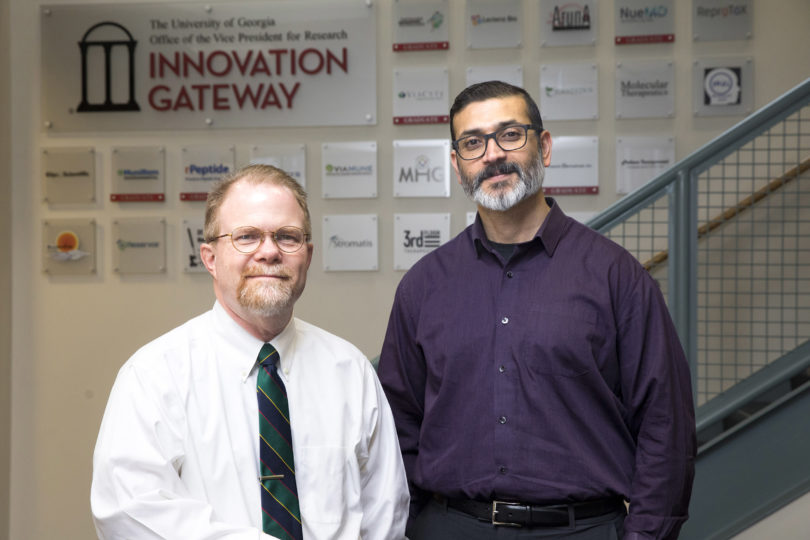Faculty members Lohitash Karumbaiah and Donnie Longenecker have been selected as the University of Georgia’s Innovation Fellows for spring 2020 and will spend the semester learning how to successfully translate their research into marketable products.
Karumbaiah is an associate professor of regenerative medicine in the department of animal and dairy science and the Regenerative Bioscience Center. He conducts preclinical research on invasive tumors and traumatic brain injuries. He previously underwent training through the UGA I-Corps Accelerator program, aiming to create solutions for these brain-related pathologies.
Longenecker, a senior lecturer in the College of Environment and Design, studies performance improvements in the landscape architecture industry and the impact of continuing education on that performance. As an Innovation Fellow, he will convert this research into educational products determined to be of value both by industry regulators and landscape architects themselves. In partnership with the CED, Longenecker’s goal is to develop and provide new educational programs to the landscape architecture industry.
Launched last fall as part of UGA’s Innovation District initiative, the Innovations Fellows program aims to encourage faculty and staff to capitalize on the resources available through UGA’s research commercialization office, Innovation Gateway, to pursue their interest in commercialization and product development.
“I-Corps introduced me to the wealth of resources and expertise available to identify unmet needs and develop products and technologies to bridge therapeutic gaps,” said Karumbaiah, whose research is currently funded by the National Institutes of Health and the National Science Foundation’s Engineering Research Center for Cell Manufacturing Therapies. “I applied to the UGA Innovation Fellows Program on the back of this experience to continue to develop the knowledge base required to translate academic research innovations into clinically viable solutions.”
“Our outreach should improve when you consider that UGA is one of the largest landscape architecture programs in the U.S., and it has recently been ranked as the No. 1 place to hire landscape architecture grads by Design Intelligence Magazine,” said Longenecker. “I’m hoping that through the process of customer discovery, developing a specific value proposition and understanding the logistics of delivery and organization, I can make our outreach efforts much more effective.”
In addition to funding of up to $10,000, each Fellow will dive into a weeklong crash course on Gateway’s innovation curriculum, which will be followed by an eight-hour-per-week commitment to complete the program.
“Our hope is to not only educate our faculty and staff on the value of the commercializing process, but also on the potential their research has for the local and global markets,” said Ian Biggs, director of the startups program in Innovation Gateway. “The ultimate goal is making our community and the world a safer, smarter place to live, and through the Innovation District initiative and our Innovation Fellows, UGA’s one step closer to meeting that goal.”








